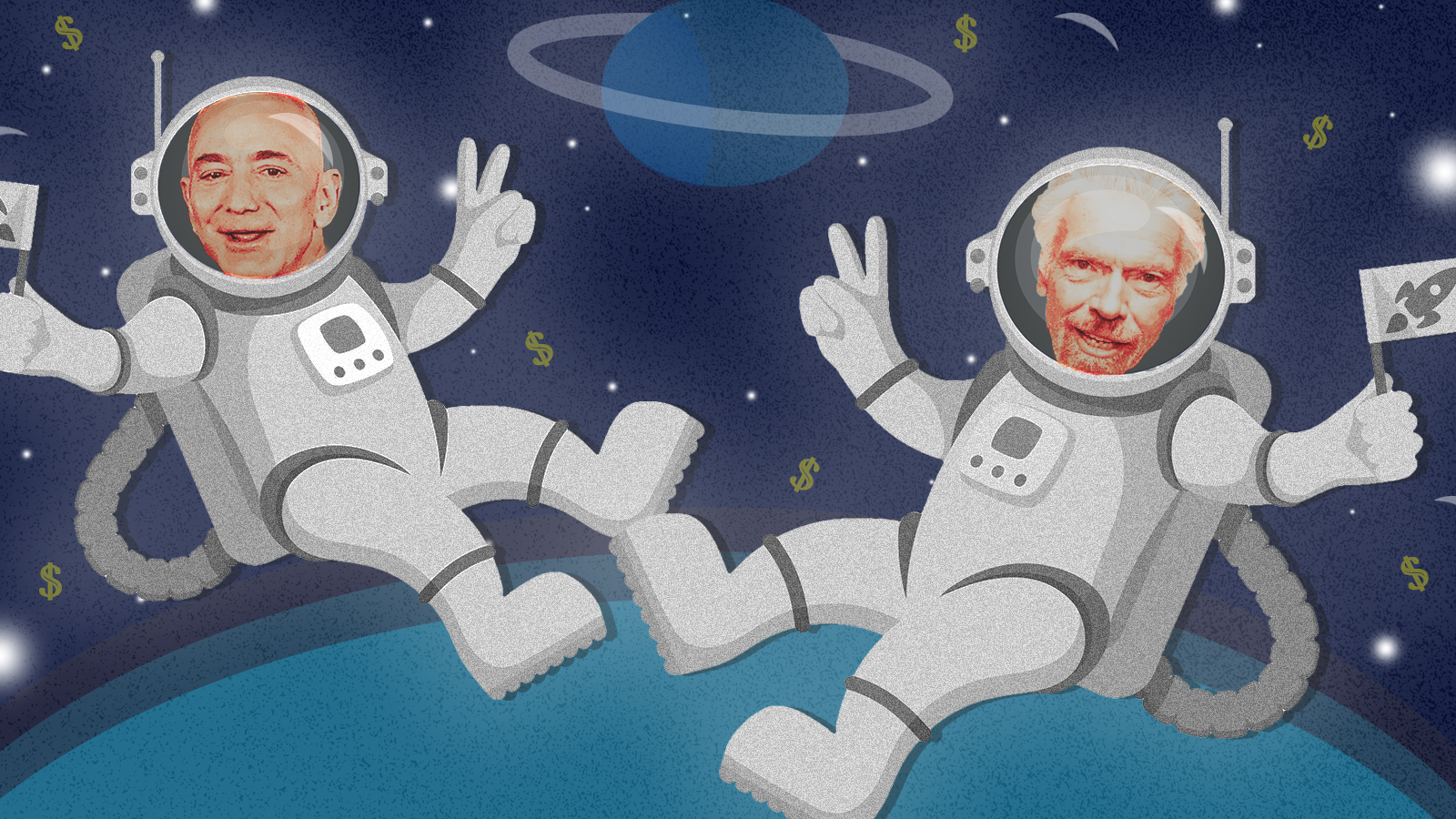The benefits of billionaires in space
This is how innovation begins


A free daily email with the biggest news stories of the day – and the best features from TheWeek.com
You are now subscribed
Your newsletter sign-up was successful
Summer of Soul, a new documentary about the 1969 Harlem Cultural Festival in New York City, draws a contrast with a better-known music concert series that summer, Woodstock. But the film also gives an alternate perspective on another big event that happened during the festival, the Apollo moon landing. After showing snippets of various white people around the country expressing wonder at the achievement (such as "It's a great thing for this country" and "It's really unbelievable"), Summer of Soul then shifts to the Black concert attendees who are far less enthusiastic. Comments by one young man are presented as the typical view: "The cash they wasted, as far as I'm concerned, in getting to the Moon could have been used to feed poor Black people in Harlem and all over the place, all over this country. So like, you know, never mind the Moon. Let's get some of that cash in Harlem."
The Space Race era "rockets versus butter" argument has resurfaced as various billionaires engage in the most heated space competition since the United States and the Soviet Union raced to the Moon in the 1960s. Virgin Galactic founder Richard Branson took a rocket plane to space (kind of) last week, while Amazon founder Jeff Bezos is scheduled to head into space on a Blue Origin rocket on Tuesday. And, of course, Elon Musk's SpaceX has energized the commercial space industry by lowering launch costs, while also returning the U.S. to human spaceflight. And Bezos and Musk both have broader ambitions to turn humanity into a space-faring civilization where millions of us are living and working in Earth orbit and beyond.
The fact that this time it's superrich guys heading into space has created a new progressive-populist twist on the long-time anti-space sentiment of the far left. "Our social, political, and economic systems are built around the idea that tax breaks for billionaires buying leisurely space travel is more important than feeding, clothing, and housing all our children," tweeted Rep. Jamaal Bowman (D-N.Y.). Sen. Bernie Sanders also chimed in: "Here on Earth, in the richest country on the planet, half our people live paycheck to paycheck, people are struggling to feed themselves, struggling to see a doctor — but hey, the richest guys in the world are off in outer space! Yes. It's time to tax the billionaires." Best-selling author Stephen King had the pithiest take on the Branson flight: "A rich guy flew in a rocket plane. Let's move on."
The Week
Escape your echo chamber. Get the facts behind the news, plus analysis from multiple perspectives.

Sign up for The Week's Free Newsletters
From our morning news briefing to a weekly Good News Newsletter, get the best of The Week delivered directly to your inbox.
From our morning news briefing to a weekly Good News Newsletter, get the best of The Week delivered directly to your inbox.
Such critiques reveal a poor sense of economic history. The Next Big Thing often starts out as a toy or as a plaything of the rich. Recall the now iconic giant cell phone used by billionaire Gordon Gekko (portrayed by Michael Douglas) in the 1987 film Wall Street. Not only are cell phones now globally ubiquitous, but they are being used in ways few could have imagined two or three decades ago, such as indigenous people living along the Amazon using cell phone and satellite data to track illegal logging. Even the basic telephone was once viewed as little more than a novelty with little useful application. (Telegraph giant Western Union famously declined Alexander Graham Bell's offer to sell the company the patent to the new device.)
No one is sure what the killer application for the space economy will be: satellite internet, travel, tourism, manufacturing, even asteroid mining. Morgan Stanley estimates the global space industry could generate revenue of more than $1 trillion or more in 2040, up from $350 billion now, with satellite broadband playing a key role in that growth. But there's already plenty of action happening, even outside the battling billionaires. Investment in space technology has doubled over the past two years, hitting $7 billion last year. And one reason the sector has so much promise is those declining launch costs. Commercial launch services such as SpaceX have helped lower the cost of reaching low-earth orbit by a factor of 20, according to NASA. (Tech developed for smartphones has also enabled smaller satellites.) What's happening in space isn't some zero-sum geopolitical race or battle of billionaire egos, but the creation of new technologies and business models that will generate jobs and economic growth.
And while you may be underwhelmed by the spinoff economic benefits from Apollo — such as freeze-dried food and fireproof fabrics — it is also important to remember that America's space program ended prematurely in the early 1970s. The space economy that we might get over the next few decades is one we should already have — and more. And if we get it, the space billionaires will deserve a lot of credit.
A free daily email with the biggest news stories of the day – and the best features from TheWeek.com
James Pethokoukis is the DeWitt Wallace Fellow at the American Enterprise Institute where he runs the AEIdeas blog. He has also written for The New York Times, National Review, Commentary, The Weekly Standard, and other places.
-
 How the FCC’s ‘equal time’ rule works
How the FCC’s ‘equal time’ rule worksIn the Spotlight The law is at the heart of the Colbert-CBS conflict
-
 What is the endgame in the DHS shutdown?
What is the endgame in the DHS shutdown?Today’s Big Question Democrats want to rein in ICE’s immigration crackdown
-
 ‘Poor time management isn’t just an inconvenience’
‘Poor time management isn’t just an inconvenience’Instant Opinion Opinion, comment and editorials of the day
-
 Are AI bots conspiring against us?
Are AI bots conspiring against us?Talking Point Moltbook, the AI social network where humans are banned, may be the tip of the iceberg
-
 Elon Musk’s pivot from Mars to the moon
Elon Musk’s pivot from Mars to the moonIn the Spotlight SpaceX shifts focus with IPO approaching
-
 Moltbook: the AI social media platform with no humans allowed
Moltbook: the AI social media platform with no humans allowedThe Explainer From ‘gripes’ about human programmers to creating new religions, the new AI-only network could bring us closer to the point of ‘singularity’
-
 Will regulators put a stop to Grok’s deepfake porn images of real people?
Will regulators put a stop to Grok’s deepfake porn images of real people?Today’s Big Question Users command AI chatbot to undress pictures of women and children
-
 Data centers could soon be orbiting in space
Data centers could soon be orbiting in spaceUnder the radar The AI revolution is going cosmic
-
 Inside a Black community’s fight against Elon Musk’s supercomputer
Inside a Black community’s fight against Elon Musk’s supercomputerUnder the radar Pollution from Colossal looms over a small Southern town, potentially exacerbating health concerns
-
 X update unveils foreign MAGA boosters
X update unveils foreign MAGA boostersSpeed Read The accounts were located in Russia and Nigeria, among other countries
-
 What's Linda Yaccarino's legacy? And what's next for X?
What's Linda Yaccarino's legacy? And what's next for X?Today's Big Question An 'uncertain future' in the age of TikTok
